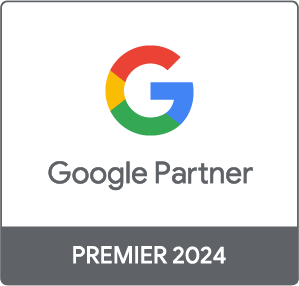Building effective B2B ecommerce PPC campaigns

Let's demystify PPC for B2B ecommerce businesses to help you increase your sales, reach, and efficiency of campaigns. Bringing in an expert can speed this up but understanding the basics of how you should be marketing your B2B ecommerce business yourself, is vital.
Find out why PPC is such a useful option for any B2B ecommerce business, how you can implement A PPC strategy, and a few tips and tricks along the way.
- The challenges of PPC in B2B ecommerce
- Why use branded campaigns for B2B ecommerce?
- What’s driving sales in B2B ecommerce PPC?
- Audience types in B2B ecommerce PPC
- Ad types in B2B ecommerce PPC
- The best B2B ecommerce keyword strategy
- FAQs for B2B PPC campaigns
The challenges of PPC in B2B ecommerce
The B2B ecommerce industry comes with its own specific challenges when implementing a PPC strategy. It can be more challenging to establish what B2B customers are searching for compared to B2C customers. To combat this, we’d recommend really understanding your audience’s needs, and what sets them apart from other similar demographics in your industry.
1. Knowledgeable customers
B2B customers know what they’re talking about, and their search results reflect this. They’re experts already, so you can’t sell to them with basic product and service benefits alone.
2. Expert research on audiences
It’s worth taking the time to work through some expert research on audiences and keywords, so you don’t end up accidentally creating yet another B2B campaign that misses your target audience entirely! (Trust us, we’ve seen too many of these!)
3. How do your clients search?
Consider how your clients search for products or services. How specific are they? Are they using industry-specific words that customers generally wouldn't know? Is there a tone of voice they respond to? The more you know, the higher the relevancy of your ads will be.
Why use branded PPC campaigns for B2B ecommerce
Even if you’re an international household name, it’s imperative you create a campaign based on your brand name keywords.
1. Keep track of your competitors
Here’s the thing; it’s vital to keep track of your competitors, who may be bidding on your brand name as a keyword as part of their PPC strategy. This is almost standard practice across many industries, so you need to ensure that your brand name brings up your ads and your brand’s products and services, not your competitors'.
2. Protect your branded space
If you want to retain control of your brand identity and any online ad space associated with your brand, branded campaigns are a must. It’s all about protecting your brand so your competitors lose the advantage over your brand name.
3. Stay front of mind
Aside from protection from competitors overtaking your ad space, branded campaigns can help keep you front and centre in the minds of users and potential customers. This can help establish trust and credibility in your online ads, increasing the likelihood of users clicking on your ads and being directed to your site.
What’s driving sales in B2B ecommerce PPC?
1. Trust
Consumers of B2B ecommerce products and services are always more likely to click on ads that they trust. This comes through an established brand identity online. PPC campaigns can help with this, by placing you at the top of the search results. You’re there to share your expertise with companies that are just as expert in their field as you are in yours, so talk to them as equals.
2. Relevance
In a saturated online market, there’s nothing more frustrating than irrelevant ads and results from specific keyword searches. Help your potential clients find you by creating a bespoke ad campaign that shows your brand and product or service only when it’s most wanted. You can do this through careful keyword planning, dedicated landing pages, and negative keyword management.
Audience types in B2B ecommerce PPC
The key to attracting the right audiences to your campaigns, saving money across your campaigns, and increasing the effectiveness of your PPC ads, all lies in understanding your audience. Here’s a brief overview of some audience types you may come across in the B2B ecommerce industry:
1. Influencers
The experts in their field. They’ll be searching for your brand with a strong list of requirements and preferences, so showcasing your brand in a slick and confident style online will help them choose you over your competitors. Just keep your ad copy highly relevant, written with their expert understanding and experience in mind.
2. Decision Makers
While the decision makers might not be the experts in every niche that their business caters to, they know what is best for the company. To win any B2B ecommerce business, you’ll need to convince them that your brand is the one to go with, and not a competitor. You can build this trust online through an established online presence across both organic and paid content, with strategic PPC campaigns that showcase the best that your brand has to offer.
Ad types for B2B ecommerce PPC
By this stage, you’re probably full of ideas of who you’d like to market to. But how do you make the best decision with your PPC campaign strategy to appeal to these audiences? The ad types that you choose to run are key. Here’s an overview to get you started:
1. Shopping Ads
Shopping ads appear at the very top of search results, with images and text of your products. These are always hyper-specific, as they’re based on a product feed that you control. Shopping ads present minute details on each product, so an expert B2B user will be presented with only the most relevant and useful results.
2. Search Ads
These ads appear at the top and bottom of search results, featuring ad copy of your choosing. This is your chance to create some highly specific campaigns with tailored ad copy written with B2B clients in mind. We’d recommend writing ads with a tone of voice and character that reflects a shared expertise, written with trust and an established B2B relationship in mind.
3. Display Ads
These are the ads that people think follow them around the internet, mostly because they do! Display ads remind B2B clients that your brand is there to help, even when they’re not searching for your brand directly. Remarketing Display ads are especially useful here.
Display ads are of course also really useful for advertising very visual products or services that are best showcased in a visual format. Why write about your speciality when you can showcase its usefulness with some stand-out graphics, video and images?
The best B2B ecommerce keyword strategy
Let’s finish up with some top tips, based on our decades of experience curating efficient campaigns for our B2B ecommerce clients.
1. Be specific
This may sound a bit obvious but get specific here. Use exact match keywords in all of your campaigns, alongside other match types to increase the reach of your ads. This helps reduce wasted clicks (that eat into your available budget) or similar searches made by B2C users.
2. Use negatives skilfully
Build up long negative keyword lists of similar products, and produce specifications like sizes, weight, shape, and other distinguishing factors that won’t serve your ad campaigns productively.
Frequently asked questions about B2B ecommerce PPC campaigns
Q: What is PPC for B2B?
PPC for B2B are paid search campaigns created specifically for businesses selling to other businesses. Often the buying cycle for a B2B client can be much longer than for B2C, depending on the product type. That means you may not sell the product or service directly online. In this case, your goal will be to drive leads and conversations rather than purchases. That will influence the different types of Google ads and the copy you use.
Q: Does PPC work for B2B companies?
PPC can work extremely well for B2B companies. Bear in mind that the types of interactions you have with B2B customers can be different to B2C ones so your goals will need to be adjusted accordingly. For example, you may be looking at targeting enquires coming in rather than direct sales.
Q: What are the benefits of B2B PPC?
B2B PPC campaigns give you the chance to gain exposure to new audiences at scale within a short period of time. This can be extremely useful, especially when launching a new product that there is little organic demand for, because not many people know about it. The options you have to be ultra-targeted with audiences and locations can really help you be efficient with driving the right leads. You can also use it to test out keyword strategies that work to inform your organic growth strategy.
Q: What’s the difference between B2B and B2C PPC?
B2B PPC campaigns are businesses advertising to other businesses. B2C PPC campaigns are when a company is advertising to an individual (consumers). The type of ad copy and creative relate to the audience type. B2B customers can behave differently to B2C ones so that should be taken into consideration in the planning and execution of campaigns.
Summary B2B ecommerce PPC campaigns
PPC is one of the most effective ways to find new clients, establish a trusted brand identity, and ultimately increase your annual profit as a B2B ecommerce company. Knowing the best way to appeal to your audiences in ways that are relevant and specific to them is the key to maximising the potential of your next PPC campaign.








